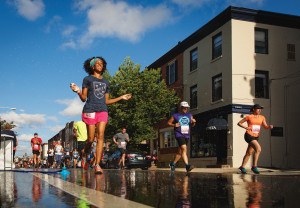How to Convince Yourself to Work Out When You Really (Really!) Don’t Want To

Shutterstock
Finding the motivation to exercise isn’t always easy. Of course, everyone wants to look good, but sometimes the promise of a tighter behind or flatter stomach isn’t enough to get you out the door. When external factors aren’t pulling their weight to keep you moving, call on a few of these other benefits of regular exercise.
A study published in the Journal of Aging and Physical Activity showed that many of these health-related outcomes were major motivating factors for those who were successful with sticking to an exercise program.
1. Remember: Exercising will make you happy (really!).
Just 30 minutes of physical activity can improve your mood and consistent, regular activity can increase your overall self-esteem and attitude. Exercise creates endorphins, or chemicals in the brain that elicit a feeling of well-being and relaxation, but it also releases a protein that behaves similarly to endorphins called BDNF (Brain-Derived Neurotropic Factor). According to Gretchen Reynolds, author of The First 20 Minutes, the benefits of endorphins and BDNF are most pronounced in the first 20 minutes of activity so it doesn’t take long to get a mood boost from exercise. How’s that for motivation after a long, hard day?
2. Remember: Exercising will make sleep come easier.
If you have trouble sleeping, exercise can help you fall asleep faster and achieve a deeper, more restful sleep. A study by the National Sleep Foundation found that people who got 2.5 hours of exercise per week fell asleep faster, slept better and were more alert during the day, which translates to higher productivity at work and in school.
Exercise raises the body’s core temperature for up to five hours, the drop in temperature triggers sleep. Just beware, because exercising too close to bedtime can have the opposite effect and keep you awake.
3. Remember: Exercising will make your life easier, too!
It’s no secret that exercise strengthens muscles and joints and improves endurance. Everyday tasks like carrying groceries, chasing the kids around the house and bending over to load and unload the dishwasher can feel easier if you work out regularly.
Physical activity gets your blood pumping, circulating oxygen and nutrients throughout your body to boost energy levels. Increase the benefits even more by adding functional fitness training to your workouts. Functional fitness training uses multi-joint and muscular movements that mimic daily activities to train your muscles to work together more efficiently.
4. Remember: Exercising could help you live longer.
Whatever your specific health concern, from diabetes to heart disease. exercise can help manage your risks. Studies show that those who engage in the amount of exercise recommended by the Department of Health and Human Services, at least 2.5 weekly hours of moderate exercise or an hour and 15 minutes of vigorous exercise weekly (Editor’s note: That’s not asking for a whole lot), lived an average of three to seven years longer than their inactive counterparts.
Exercise increases blood flow through the arteries of the heart to lower blood pressure. It also reduces triglycerides and bad cholesterol (LDL) associated with heart disease. It boosts the immune system and reduces the levels of insulin, estrogen and progesterone in the blood. All of this can help lower the risk of cancer-related tumors. Finally, exercise is also known to prevent and, in some cases, reverse type 2 diabetes both by decreasing visceral body fat and making the body more insulin efficient, or better at burning fat.
So, next time you’re tempted to skip the gym, remember that there’s more to exercise than meets the eye and you don’t need hours upon hours of exercise each day to reap the rewards.
……………
Brian Maher is the owner of Philly Personal Training, a private personal training studio in the Rittenhouse Square area. He and his staff of personal trainers offer packages to busy individuals looking to make lifestyle changes by improving their overall fitness and wellness. Read all of Brian’s posts for Be Well Philly here.
Like what you’re reading? Stay in touch with Be Well Philly—here’s how:
- Like Be Well Philly on Facebook
- Follow Be Well Philly on Twitter
- Follow Be Well Philly on Pinterest
- Get the Be Well Philly Newsletter


